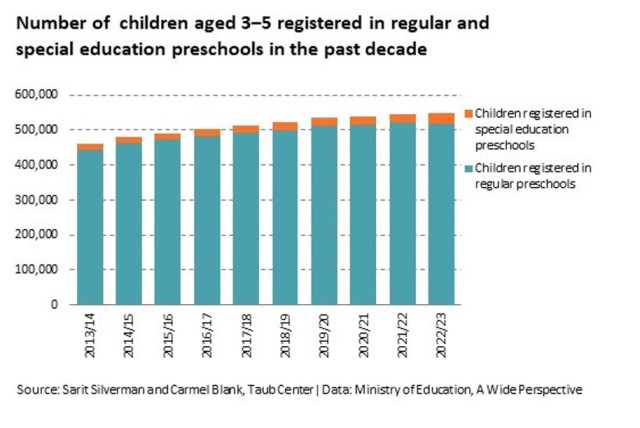Special education for preschoolers and early education neglected, underfunded - report

A new report highlights the scope that special education for young children is underfunded, undermanned, and neglected.
Young children in special education classes are particularly vulnerable in ordinary times and even more so in wartime. In view of the increase in the proportion of children with special needs, the preschool system will require additional staff with special education training in the coming years, according to the just-released last chapter of the State of the Nation Report by the Taub Center for Social Policy Studies in Jerusalem.
The number of children in special education is increasing, but in the absence of hard data, it is difficult to formulate policy. In 2022, an estimated 1,286,000 Israeli children from birth to age six, and by 2032, that number is expected to reach 1,476,000.
Taub researchers Dr. Sarit Silverman and Dr. Carmel Blank focused on the unique challenges facing policymakers to improve the quality of early childhood education and daycare frameworks. In the 2022/23 school year, there were about 520,000 children registered for regular preschools and about 27,000 registered for special-education preschools. Between the 2018/19 and 2022/23 school years, the number of children in regular preschools increased by 3.9%, while the number in special-education preschools rose five times faster, at a rate of 20.3%.
More than 90% of the daycare center directors reported problems in recruiting new staff members, and almost 60% of the caregivers in the subsidized daycare centers and 40% in the private daycare centers reported that they often consider leaving the profession, with the most common reason cited being low wages. Other reasons cited were the difficult work and the large number of children in the group.
Issues persist at special education facilities
To assess the severity of the manpower problem in daycare facilities for children aged three months to three years, Blank surveyed teachers/caregivers and directors in the daycare centers. The survey was distributed between January and March 2023 in Hebrew and Arabic. “The findings paint a worrying picture. More than 80% of the directors of subsidized daycare centers and two-thirds of those in private daycare centers reported a shortage in manpower on at least one or two days per week. Many of the respondents reported a shortage of three days per week or more.
The research stresses the importance of collecting comprehensive data on children with special needs, including the ability to distinguish between those attending special-education preschools and those who are integrated into regular preschools, along with sociodemographic data and information on their types of disorders. The data are critical to evaluate the early childhood special education system and to ensure that youngsters from all sectors and socioeconomic strata are given equal opportunity to attend an educational framework that meets their needs. Unfortunately, these data are currently not available, the Taub researchers write.
One of the policy alternatives they proposed is increased supervision of daycare centers that will make possible the systematic gathering of data on them, staffing, and the children attending them.
About a year ago, the government presented a “revolutionary, five-year plan” in early childhood education and care frameworks to reduce the cost of living among parents of young children. This would have supposedly been achieved with increased subsidies for supervised preschools and the provision of tax credits for working parents of children from birth to age three. Although these benefits would have brought about a certain reduction in tuition for parents, in the absence of price regulation, tuition fees could subsequently increase and the financial burden may return to its previous level or even beyond that, they wrote.
In addition, the program designates large budgets for the construction of subsidized preschools, but the budgets that have already been allocated for the construction of preschools have not been fully used, particularly by the Arab local authorities. The program that was formulated does not deal with the numerous barriers to constructing new facilities, they continued.
Another aspect of the five-year program focuses on the improvement in the quality of education and includes an expansion of the system for supervision and training of staff and improvement in the ratio of staff to children. A persistence grant is being provided to teachers/caregivers and is spread out over more than a year, but the program fails to bring about the improvement of working conditions in a fundamental way even though this is the most likely way to attract highly skilled manpower and keep them in the system.
“The findings emphasize the limitations of the plan. It does not reduce the number of children in a group nor does it significantly improve the working conditions of the teachers/caregivers,” Blank asserted. “Although the program raises the wages of caregivers in the subsidized daycare frameworks, it does not close the gap between their wages and those of caregivers in the private daycare frameworks, which also suffer from a shortage in manpower.”
The researchers propose an increase in the number of special-education preschools. The worsening manpower crisis in the daycare frameworks in both quantity and quality is preventing the expansion of the early childhood education/daycare system and the improvement of the staff-to-child ratio. They recommended that the focus should be placed on increasing the number of staff and ensuring that high-skilled workers are recruited and retained.
To accomplish this, there is no alternative but to fundamentally improve working conditions, including wages, expand the development of training and professional advancement programs, and reduce the burden on caregivers by reducing the staff-to-child ratio.
As the ultra-Orthodox (haredi) and Arab populations are growing, and to ensure that there are sufficient educational frameworks for all, large-scale investment is needed in infrastructure, particularly in light of the high incidence of poverty among these groups, they continued.
Silverman concluded that “there is an increasing recognition of the importance of early childhood education both in public discourse and among policymakers. Given the severe manpower situation and the demographic forecasts for the coming decade, steps should be taken as soon as possible to ensure high-quality and accessible early childhood education and child care.”
Jerusalem Post Store
`; document.getElementById("linkPremium").innerHTML = cont; var divWithLink = document.getElementById("premium-link"); if (divWithLink !== null && divWithLink !== 'undefined') { divWithLink.style.border = "solid 1px #cb0f3e"; divWithLink.style.textAlign = "center"; divWithLink.style.marginBottom = "15px"; divWithLink.style.marginTop = "15px"; divWithLink.style.width = "100%"; divWithLink.style.backgroundColor = "#122952"; divWithLink.style.color = "#ffffff"; divWithLink.style.lineHeight = "1.5"; } } (function (v, i) { });

